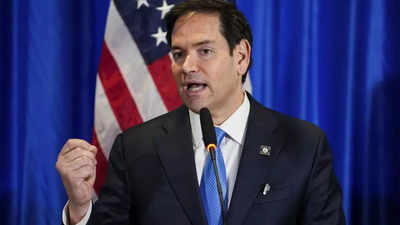US secretary of state Marco Rubio issued a warning to Venezuela on Thursday, cautioning against any aggressive action towards oil rich neighbour, Guyana. Speaking in Georgetown, Rubio made it clear that the United States would not stand by if Venezuela attempted to seize the disputed, oil-rich Essequibo region.
“I have full confidence saying it now as secretary of state — there will be consequences for adventurism. There will be consequences for aggressive action,” Rubio declared at a joint news conference.
When asked about the potential US response to an attack on ExxonMobil oil projects in Guyana, Rubio did not explicitly confirm a military intervention but delivered a blunt message: “It would be a very bad day—a very bad week for them.”
He added, “We have a big navy, and it can get almost anywhere.”
The comments drew an angry response from Venezuelan President and leftist leader, Nicolas Maduro, who called Rubio an “imbecile” and rejected any foreign interference.
“No one threatens Venezuela,” Maduro said.
Security pact and rising tensions
During his visit to Guyana, Rubio signed an agreement to strengthen security cooperation between the two countries, focusing on intelligence sharing. It comes years after Guyana and the United States agreed to joint maritime patrols.
Guyanese President Irfaan Ali welcomed Washington’s firm stance, calling Venezuela’s claim to Essequibo “illegitimate.” He expressed satisfaction with the US commitment to safeguarding Guyana’s territorial integrity.
Venezuelan foreign minister Yvan Gil responded via Telegram, stating that Venezuela does not “seek conflicts, but neither will we allow foreign interests to try to rewrite the reality about our Essequibo.” he said.
“Get your noses out of this dispute!”
Meanwhile, Mauricio Claver-Carone, the US special envoy on Latin America, suggested that Washington envisions a future “binding” security relationship with Guyana—similar to how US forces protect oil-rich Gulf states from larger regional threats.
The long-standing border dispute between Venezuela and Guyana dates back centuries. While Guyana asserted that an 1899 arbitration ruling settled the matter, Venezuela insisted the Essequibo River should serve as the natural boundary—a claim rooted in maps from 1777.
The stakes have risen dramatically since ExxonMobil discovered vast offshore oil reserves in 2015. Guyana’s production is expected to reach 1.3 million barrels per day by the end of the decade—surpassing Venezuela’s current output.
Meanwhile, US policy towards Venezuela has been increasingly aggressive. Under pressure from anti-communist Latino lawmakers, Washington has tightened sanctions on the Maduro government, including revoking Chevron’s exemption to operate in the country.
Rubio later visited Suriname, another fast-growing oil producer, further underlining the US’s strategic interest in the region.




